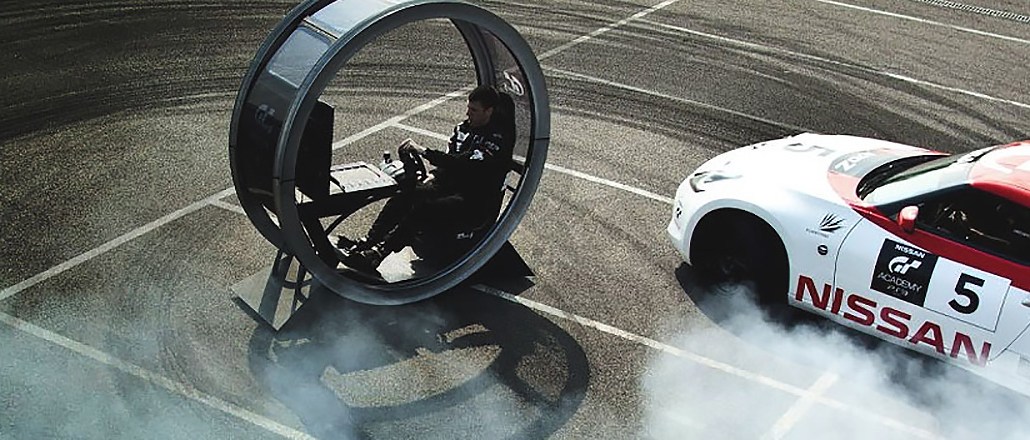Save 50% on a 3-month Digiday+ membership. Ends Dec 5.

It turns out some video-game skills do translate to the real world. In January, Nic Hammann sped around a Dubai race track in the first professional event of his racing career. A year earlier, the bulk of his training had consisted of playing the racing video game “Gran Turismo.”
The idea was Nissan Europe’s: Take the best video-game racers, and put them inside real race cars. So back in 2008, the carmaker teamed up with Sony Computer Entertainment and Polyphony Digital, creators of racing simulator “Gran Turismo,” to bring the top performers in the digital realm onto the tarmac.
Several years later, the brands’ U.S. counterparts took it one step further, presenting the gamers’ trials as a reality-television series, which airs on Spike TV. The prize: a racing contract with Nissan. Now, four seasons in, “GT Academy” has become a valuable marketing tool for Sony and Nissan, attracting millions of viewers across Spike TV, MTV2, Hulu and YouTube.
“Games are attracting a lot of the younger [car] buyers or customers,” said Rick Kulach, senior planner of motorsports marketing communications at Nissan North America. “‘GT Academy’ is a way to both create a driver-development program and engage younger customers.”
The “GT Academy” format has remained consistent throughout all four seasons of the show. Gamers across the world compete in the latest iteration of “Gran Turismo” — currently “Gran Turismo 6” — for the best race times on the game’s online leaderboards. Nissan and Sony subsequently pluck the best digital racers to participate in a real-life race camp, where they compete against each other throughout various training and trials in hopes of winning the “GT Academy” championship. But that’s just the beginning for these emergent pros, who have gone on to win major races for Nissan, most recently the 2015 Bathurst 12 Hour endurance race in Australia. Alongside teammate Katsumasa Chiyo, “GT Academy” champs Wolfgang Reip and Florian Strauss topped the podium at Australia’s world-famous Mount Panorama circuit, besting other pro drivers in a dramatic final sprint.
“You have the TV show side, which is truly driving Nissans during a lot of the competitions. It’s a very good way of showcasing some product,” said Kulach. “But you have the racing side, too. There are communities of fans following these guys and their development. They’re rock stars for the younger kids at the track.”
Ad position: web_incontent_pos1
TBWA\Chiat\Day, the creative agency that produces “GT Academy,” aims to keep the challenges within the show true to the spirit of race culture. That approach has fared better for Nissan and Sony than other similar efforts. Back in 2010, Sony Computer Entertainment created another PlayStation-oriented reality series called “The Tester,” which had gamers compete for a job as a PlayStation game tester. The third season premiere featured a challenge in which contestants had cockroaches poured over their heads, “Fear Factor”-style. Wired called that series “a trashy reality TV show,” while it referred to the GT Race Academy concept as “a smart marketing blitz.” “GT Academy” attracts regular media coverage from both the auto and gaming worlds.
“We’ve always been mindful that, while, yes, it’s a competition show — guys compete and get eliminated — we wanted to make sure it was never gimmicky or we were never stretching it beyond finding the next great Nissan racing driver,” said Tim Newfang, a producer at TBWA\Chiat\Day LA.
The fourth season attracted close to 5 million U.S. viewers across six episodes, according to Newfang, an increase from the prior season. On March 13, Nissan and TBWA\Chiat\Day released some bonus content for the series, a 30-minute documentary special called “From a Dream to Dubai,” following season-four champ Nic Hammann as he competes in the 24 Hours of Dubai endurance race.
“When you watch that content, you really get to see his personality shine through,” said Newfang. “It’s been great to see the show’s progress throughout the years, to air on channels like Spike and Hulu and have people receive ‘GT Academy’ as entertaining content as opposed to a traditional ad experience.”
More in Marketing

Ulta, Best Buy and Adidas dominate AI holiday shopping mentions
The brands that are seeing the biggest boost from this shift in consumer behavior are some of the biggest retailers.

U.K. retailer Boots leads brand efforts to invest in ad creative’s data layer
For media dollars to make an impact, brands need ad creative that actually hits. More CMOs are investing in pre- and post-flight measurement.
Ad position: web_bfu